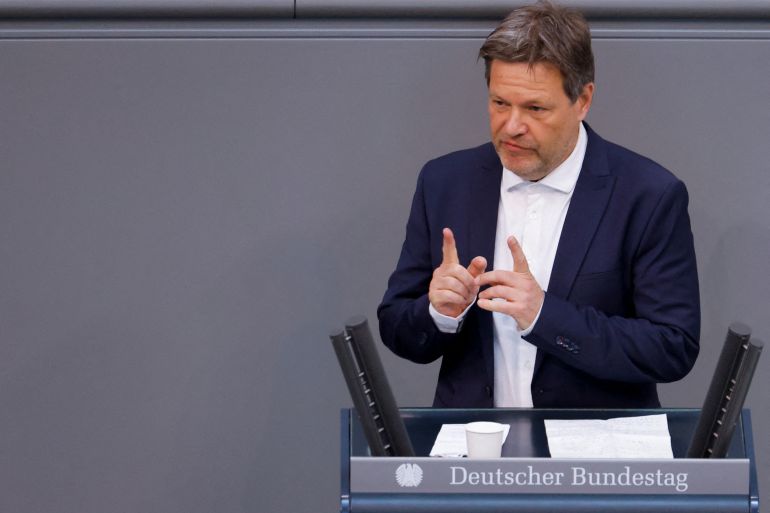Gas supply crisis fears grow as Germany triggers ‘early warning’
First step under emergency gas plan activated as Germany prepares for potential cut-off over refusal to make payments in roubles.

Germany has taken the first official step towards gas rationing as fears grow over a potential stop in Russian deliveries amid a standoff over payments in roubles.
The move by the European Union’s industrial powerhouse on Wednesday to activate the “early warning” phase” of an emergency gas law was the clearest sign yet countries in the bloc were preparing for supply issues after rolling out far-reaching sanctions in the wake of Russia’s invasion of Ukraine last month.
Keep reading
list of 3 itemsGermany launches probe into suspected war crimes in Ukraine
Germany to buy US-made F-35s capable of carrying nuclear weapons
“A crisis room will now be established in the ministry,” economics minister Robert Habeck told reporters in Berlin, adding that the team will be comprised of members from his ministry, the country’s regulator and the private sector.
The “early warning” measure, the first of three alarm levels under the German government’s emergency gas plan, was “preventative” and intended to assure supply of the fuel, said Habeck, who is also energy minister and vice chancellor.
Gas reserves were currently at 25 percent of capacity, Habeck added, cautioning that a stop to deliveries from Russia would have “serious” consequences, though supplies continued to flow normally.
In a move seen as an effort to bolster its beleaguered currency, Russia said last week it would draw up a mechanism by March 31 under which “unfriendly countries” – those that have imposed sanctions – would pay for gas in roubles. Most now pay in euros or United States dollars.
Moscow is expected to unveil new rules for gas payments on Thursday.
On Tuesday, the Kremlin reiterated the payment demand for gas deliveries to the EU – after ministers from the Group of Seven countries called this arrangement “unacceptable”.
“We are not going to accept a breach of the private contracts” for gas deliveries, Habeck said in the news conference.
The invasion of Ukraine has prompted a series of sanctions on Russia that have left it scrambling for foreign currency reserves. However, Europe has not cut off its purchases of oil and gas.
Germany is highly dependent on Russian gas for its energy needs, with 55 percent of its supplies being delivered along pipelines from the country before the invasion of Ukraine. The figure fell to 40 percent in the first quarter of 2022.
Since the outbreak of the war, Germany has accelerated plans to wean itself off Russian gas and diversify its supplies. Habeck said Germany will not achieve full independence from Russian supplies before mid-2024.
Should the situation require Germany to implement its highest warning level, officials would likely take over distribution to make sure gas was available for “protected customers”, which means households, hospitals, fire companies and the police.